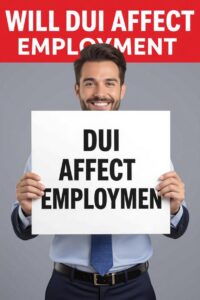Will A Misdemeanor Dui Affect Employment?
A misdemeanor DUI isn’t just a legal hiccup—it’s a data point on your public record that tells a story, whether accurate or not, about decision-making, responsibility, and risk.
A misdemeanor DUI (Driving Under the Influence) charge can have lasting consequences beyond legal penalties—especially when it comes to employment.
While it’s not a felony, a DUI still appears on your criminal record and can impact job opportunities, background checks, and professional licensing.
Whether you’re currently employed or searching for a new job, understanding how a misdemeanor DUI may affect your career is essential to protecting your future.
Will A Misdemeanor Dui Affect Employment?
A misdemeanor DUI can affect your employment but it’s not a career death sentence. It’s a red flag that can often be addressed with honesty, preparation, and time.

The bigger impact usually comes from how you handle the aftermath not just the charge itself.
Factors That Determine How Misdemeanor Dui Affect Employment?
Here’s a list of key factors that determine how a misdemeanor DUI can affect employment hiring chances, job security, and career growth, depending on multiple variables.
1. Industry or Job Type
Some jobs care much more about a DUI than others:
High-risk or safety-sensitive roles
- Jobs involving driving, operating machinery, or ensuring public safety (e.g., truck drivers, pilots, EMTs) are especially strict. A DUI could immediately disqualify you due to insurance, liability, or legal restrictions.
Professional or licensed fields
- Doctors, nurses, lawyers, teachers, and other licensed professionals may face review or sanctions by licensing boards. Even a single DUI can trigger ethics or conduct investigations.
Finance, government, and security roles
- Jobs that involve handling money, accessing sensitive data, or holding government clearance often have strict background check policies. A DUI may be seen as a character or judgment concern.
Creative, tech, or non-driving roles
- In many tech companies, startups, or creative fields, a DUI might matter less—especially if it was an isolated event and not recent.
2. Recency of the DUI
- A recent DUI (within the last 1–3 years) is more likely to raise red flags, especially if it suggests a pattern or unresolved behavior.
- Older DUIs—particularly if you’ve stayed clean and completed sentencing—are usually viewed more leniently, especially if you can demonstrate personal growth.
3. Number of Offenses
- A single misdemeanor DUI may be seen as a mistake or lapse in judgment.
- Multiple DUI convictions can signal a deeper problem and significantly impact your employability, particularly in any role requiring public trust or responsibility.
4. Background Check Policies of the Employer
- Some employers conduct extensive background checks (especially government contractors, hospitals, schools).
- Others may only check for felonies, or not at all—especially for entry-level or gig economy jobs.
- Employers in “ban-the-box” states (which restrict when and how criminal history can be used in hiring) may be legally limited in how they respond to a misdemeanor DUI.
5. State Laws & Expungement Options
States vary in how long a DUI stays on your record and whether it can be expunged.
- In states like California, a DUI can be expunged under Penal Code 1203.4, helping limit employer access during background checks.
- Other states (e.g., Florida, Georgia) don’t allow DUI expungement at all—making the conviction more permanent.
6. Insurance Requirements (for Driving Jobs)
- If your job involves operating a company vehicle, the employer’s insurance policy might not allow them to cover drivers with a DUI on their record.
- This isn’t a matter of opinion—it’s a legal and financial liability they must avoid.
7. Company Culture and Discretion
- Smaller companies or startups may be more forgiving and willing to look at the whole person rather than just a criminal record.
- Larger corporations often follow strict HR policies that leave little room for discretion, especially if the position is highly visible or sensitive.
8. Your Response & Rehabilitation
- Employers often pay attention to how you explain the incident. Are you honest, accountable, and proactive?
- Completion of rehab programs, therapy, community service, or volunteering can show growth and maturity.
- Letters of recommendation, character references, and evidence of sobriety help shift the narrative from “risk” to “resilient.”
9. Whether You Were Convicted or Not
- A DUI arrest is not the same as a DUI conviction.
- If the charge was dropped, reduced (e.g., to reckless driving), or deferred through a diversion program, it may not be considered a criminal conviction.
This distinction can change how (or whether) employers view the incident on your background report.
10. Type of Background Check Used
- Basic checks (Level 1) might not show misdemeanors at all in some states.
- Level 2 or FBI checks (used for healthcare, education, and government work) will show all convictions, including misdemeanors, across state lines.
How Long Will A Misdemeanor Dui Affect Employment?

A misdemeanor DUI can affect employment for anywhere from 1 to 10+ years, depending on:
- State laws (especially regarding expungement)
- Industry/job type
- Whether it was a first-time or repeat offense
Expungement Process For Misdemeanor Dui?
Expunging a DUI misdemeanor isn’t universally accessible—it depends heavily on where your case occurred.
In many states (e.g., California, Arizona, Arkansas, Indiana), some form of relief exists but often involves waiting periods, sentencing completion, and judicial discretion.
In others (e.g., Florida, Illinois, Georgia), convictions simply aren’t eligible.
This overview will help you understand the key principles, timelines, and regional differences, offering clarity and actionable insight.
General Principles Across Most States
1. Eligibility Requirements
- Must have completed all sentencing requirements: probation, fines, treatment programs, community service, etc.
- No pending criminal charges or new offenses since the DUI conviction.
2. Waiting Periods Vary
- Some states allow immediate filing after probation completion (e.g., California).
- Others impose waiting periods from 1 to over 10 years, depending on jurisdiction and DUI severity.
3. Filing the Petition
- Requires submitting a petition to the court where the DUI was handled, along with a filing fee and sometimes service to the district attorney.
4. Judicial Discretion and Hearings
- The judge reviews the petition and decides if granting expungement is fair and in the public interest. Some jurisdictions hold a hearing.
5. Outcome of Expungement
- A successful expungement usually removes the conviction from public access, like employment background checks. However, law enforcement and licensing bodies may still access it.
In many places, expungement does not erase driving history—subsequent DUI offenses may still count against you.


